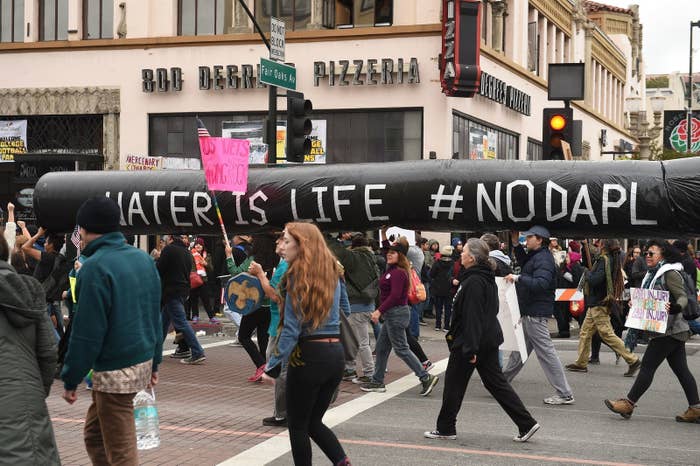
WASHINGTON — With completion of the Dakota Access pipeline quickly drawing near, an American Indian tribe argued in court on Tuesday that a judge should halt construction because the pipeline would spiritually contaminate water used for sacred rituals.
This religious freedom argument represents a final push by the Cheyenne River Sioux Tribe to stop the pipeline. Construction has moved at a fast pace since the US Army Corps of Engineers earlier this month granted an easement that allows the private company building the pipeline to go through federal land.
The tribe says the oil that will flow through the pipeline is a black snake prophesied to cause destruction. The pipeline would cross through the lake bed under Lake Oahe, which the tribe uses for religious rituals. The mere presence of the oil under the lake would contaminate the water, even if the oil never actually touched it, Nicole Ducheneaux, the lawyer arguing for the tribe, said on Tuesday.
US District Judge James Boasberg, sitting in Washington, DC, asked Ducheneaux about whether the tribe’s argument that the easement violated the federal Religious Freedom Restoration Act — raised for the first time in court papers filed on Feb. 9 — was too last-minute for him to consider it. Under a legal doctrine known as laches, judges can toss out claims if they conclude a party wasn’t diligent in pursuing them.
Ducheneaux replied that the tribe raised concerns about the water being sacred during the Army Corps’ earlier review of the project, although she conceded that they specifically hadn’t made a claim under the religious freedom law. She also argued that they filed the claim as soon as the Army Corps granted the easement, so there wasn’t any delay.
Boasberg said he hoped to rule within the next week. According to Dakota Access’ lawyers, they expect the pipeline to be operational between the week of March 6 and the week of April 1. Pressed by Boasberg to be more specific on Tuesday, a lawyer for Dakota Access, David Debold, said that there was a “low likelihood” the pipeline would be done by the week of March 6.
Boasberg ordered the pipeline company to give 48 hours notice before they begin moving oil through the pipeline if he had yet to rule on the tribe’s request for an injunction.
Under the Obama administration, the Army Corps of Engineers halted construction on the pipeline, saying it would consider whether an environmental review was needed. President Trump reversed course, ordering the Army Corps to expedite consideration of the easement request.
Ducheneaux on Tuesday invoked recent Supreme Court decisions that dealt with religious freedom claims, including 2014's Burwell v. Hobby Lobby, the successful religion-based challenge to the contraception care mandate in the Affordable Care Act. She said that these cases restricted courts in probing the sincerity and validity of religious beliefs, and provided broader protections for religious freedom claims than under the First Amendment.
Boasberg pointed out that courts could look into religious beliefs in these types of cases, they just had to “tread lightly.” He asked Ducheneaux about whether there were other sources of water accessible to the tribe that they could use for rituals — she said there were not — and about the existence of other industrial projects that affected waterways connected to Lake Oahe.
US Department of Justice lawyer Reuben Schifman, arguing for the Army Corps, said that unlike in the Hobby Lobby case, where the challengers faced millions of dollars in penalties if they refused to provide employees with insurance coverage for contraceptive care that went against their religious beliefs, the granting of the easement for the pipeline didn't impose a penalty on the tribe.
Lawyers for the Army Corps and Dakota Access argued that beyond the religious freedom claim coming too late, the tribe failed to show that the easement and completion of the pipeline would burden its religious practice. They cited a 1988 Supreme Court decision, Lyng v. Northwest Indian Cemetery Protective Association, in which the justices in a 5-3 decision rejected a challenge to the chopping down and harvesting of trees in a national forest that American Indians had used for rituals.
Boasberg raised the issue of the government’s ability to take action on its own land with Ducheneaux, asking, “Where do we draw the line?”
Ducheneaux replied that the line in this case was clear because the tribe had a right that was recognized by the federal government to use the waters of Lake Oahe.
